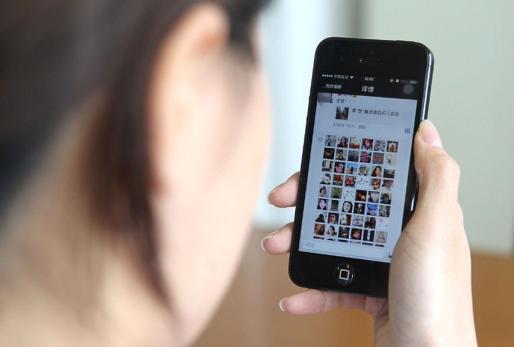

A young woman in Shanghai checks the likes she has collected for a message she posted on WeChat. This popular function has been abused and used for scams. (Photo source: Shanghai Daily)
IT has became a fad to collect "likes" or thumbs-up — in this case little heart-shaped icons — on the popular Moments (pengyou quan, literally "friends circle") of popular social media chatting site WeChat.
People frequently give out hearts to various posts, especially their friends' posts and photos about anything from the latest movies to their pets to what they had for dinner.
Collecting hearts is a kind of status symbol.
However, this popular function has also been abused and used for scams — part of a growing problem of Internet fraud in a nation with more than 600 million people online and e-commerce transactions estimated to total 18 trillion yuan (US$2.9 trillion) by 2015, according to the Ministry of Commerce.
Some cases are trifling, some serious. Problems are caused by lack of supervision and regulation, which is difficult, huge incentive to defraud and lack of awareness among gullible internet users.
Becky Sun, an accountant in her 20s, usually shares photos of food, inspiring articles and her feelings about life in her friends circle. A couple of weeks ago she was drawn to a promotion saying that with at least 26 likes from friends and acquaintances, she could get a free trip to Hainan Province, Yunnan Province or Hong Kong.
"Out of curiosity, I quickly acquired the likes and sent back a screen shot," Sun says. "I later found the coupons offered by a travel agency were of questionable value."
The coupons asked for advance gratuities to guides. The travel itinerary was obscure, with lots of arranged shopping and possibilities of extra charges.
Sun decided to give up the coupons.
This was a very small case, but with the popularization of social media, information about free products and services is everywhere. They include movie tickets, buffet coupons, digital coupons, spa services and many other products. Some are legitimate, some are not, and gullible people can lose money.
It's common to ask people to collect likes and many go along because of the low level of participation.
Some Internet users were told they would get a free iPhone 5s after collecting 36 likes, but each was charged an advance fee of 25 yuan. Weeks after sending the money, people realized it was a fraud because they did not get an iPhone for 25 yuan. If it sounds too good to be true, it probably is.
Young IT engineer Zheng Zhe says collecting likes is a creative approach in new media marketing and he has gotten a lot of free movie and play tickets and dinner coupons.
But he has also made mistakes — some promotions that offered free gifts finally said he was late and nothing was left.
A gold jewelry shop that promised to send him jewelry required him to collect the jewelry in person at a store in northeastern China.
"Now I have to double check the information sources," Zheng says. "I only take part in promotions by reputable companies and never put my trust in adverts for expensive prizes or gifts."
Compared with loss of time, effort and small sums of money, the loss of private information through careless use of social media is very serious.
Fraudsters and hackers have stolen money from online bank accounts using personal information shared on popular social networking websites.
After getting detailed personal information such as telephone number, identification number, age and address, frauds can report the loss of a cell phone with a fake ID. Using a new SIM card with the victim's phone number, he or she can log onto an Alipay (the finance arm of Alibaba) or bank account and reset the password.
"Data and personal information form a circle or a chain of online activities but it's very dangerous when a key link is decoded," Zheng says.
It's not difficult to apply for a new SIM circuit at cell phone service counters with fake ID. Very few professional electronic scanners there are equipped to examine ID cards. Besides, it's easy to apply for a WeChat public account.
Social media is difficult to regulate and supervise.
The safety of network information has become a worldwide problem of concern to Facebook, Twitter, Linkedln, WeChat, QQ and Weibo, among other networks. The issue is especially serious in China, which has the world's biggest online population and booming e-commerce.
Experts say securing online information is a long-term and systematic project that requires better laws, technology and public awareness.
China lacks relevant laws, regulations and enforcement on theft of personal information, so scammers are not taking big risks, according to Wang Huaibin, deputy secretary-general of the Shanghai Information Security Trade Association.
"Many fraudsters don't get caught because of the difficulty of investigating and collecting evidence in cyberspace," Wang says. Weak supervision combined with big financial incentives and little fear of apprehension may lead to big problems one day, he says.
"Currently online payment systems have focused too much on user convenience," Wang says, adding that new technology should be developed to enhance security.
Biometric payment systems are good because it's impossible to disguise fingerprints and difficult to disguise a voice, he observes. But it's expensive and very involved.
Experts urge users not to connect their online Alipay accounts with debit cards carrying a large balance. Passwords should be complicated and daily spending limits should be set.
If mobile phones are out of service for an unknown reason, users should check their bank and online payment accounts as soon as possible. Dubious QR codes should not be scanned in case of Trojan Horse viruses.
Copyright ©1999-2018
Chinanews.com. All rights reserved.
Reproduction in whole or in part without permission is prohibited.